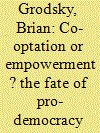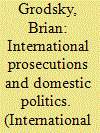| Srl | Item |
| 1 |
ID:
116311


|
|
|
|
|
| Publication |
2012.
|
| Summary/Abstract |
Western governments spend millions of dollars annually supporting the non-governmental sphere, and especially pro-democracy organisations, in non-democracies. The essay explores how inclusion of pro-democracy organisations into the state after democratic breakthrough can enhance or inhibit democratic consolidation, arguing inclusion can actually weaken the NGO community by creating rifts between one-time partners with suddenly disparate agendas. This argument is applied to the case of Georgia following the 2003 'Rose Revolution'. Evidence is based on elite interviews conducted in summer 2007.
|
|
|
|
|
|
|
|
|
|
|
|
|
|
|
|
| 2 |
ID:
058747


|
|
|
| 3 |
ID:
103670


|
|
|
|
|
| Publication |
2011.
|
| Summary/Abstract |
Students of bargaining have long focused on the dual nature of international negotiations, which take place both internationally and domestically. The prevailing wisdom is that under certain conditions political leaders can use domestic constraints to get a better deal at the negotiating table. In this article, I argue that under certain conditions leaders have an incentive to use 'international constraints' to pressure their domestic constituents into accepting a particular policy. I apply this argument to the Serbian and Croatian cases of Western pressure for cooperation with the International Criminal Tribunal for the former Yugoslavia (Hague Tribunal).
|
|
|
|
|
|
|
|
|
|
|
|
|
|
|
|
| 4 |
ID:
093000


|
|
|
|
|
| Publication |
2009.
|
| Summary/Abstract |
Since the end of the Cold War, increased efforts at international criminal justice have begun to transform transitional justice for the worst cases of atrocities from a predominantly domestic affair to an international one. I examine side-effects of international pressure for criminal justice, arguing that political elites struggling to balance conflicting international and domestic demands may launch "compromise justice" policies designed to satisfy both, but which in effect weaken mechanisms that transitional justice scholars posit make postconflict reconciliation most likely. I apply this argument to the former Yugoslavia, examining Serbian and Croatian truth commissions as a form of "compromise justice.
|
|
|
|
|
|
|
|
|
|
|
|
|
|
|
|
| 5 |
ID:
093091


|
|
|
|
|
| Publication |
2009.
|
| Summary/Abstract |
Scholars and policymakers have turned increasing attention to questions of transitional justice, those legal responses to a former regime's repressive acts following a change in political systems. Although there is a rich, interdisciplinary literature that addresses the value of various transitional justice measures, theoretical arguments for how and under what conditions we should expect to see these measures implemented tend to gravitate to intuitively appealing relative power considerations. But attempts at parsimony have tended to leave the dependent variable either overly restrictive or poorly defined, yielding theories that are difficult to test. In this article, the author proposes a 'transitional justice spectrum' based on a hierarchical series of possible accountability mechanisms and designed to allow researchers to conduct more rigorous, cross-national tests of justice arguments. The objective here is not to posit a broad theory of transitional justice, but to open the debate into a methodological weakness in the transitional justice literature. The article includes seven accountability mechanisms: cessation and codification of human rights violations; condemnation of the old system; rehabilitation and compensation for victims; creation of a truth commission; purging human rights abusers from public function; criminal prosecution of 'executors' (those lower on the chain-of-command); criminal prosecution of commanders (those higher on the chain-of-command).
|
|
|
|
|
|
|
|
|
|
|
|
|
|
|
|